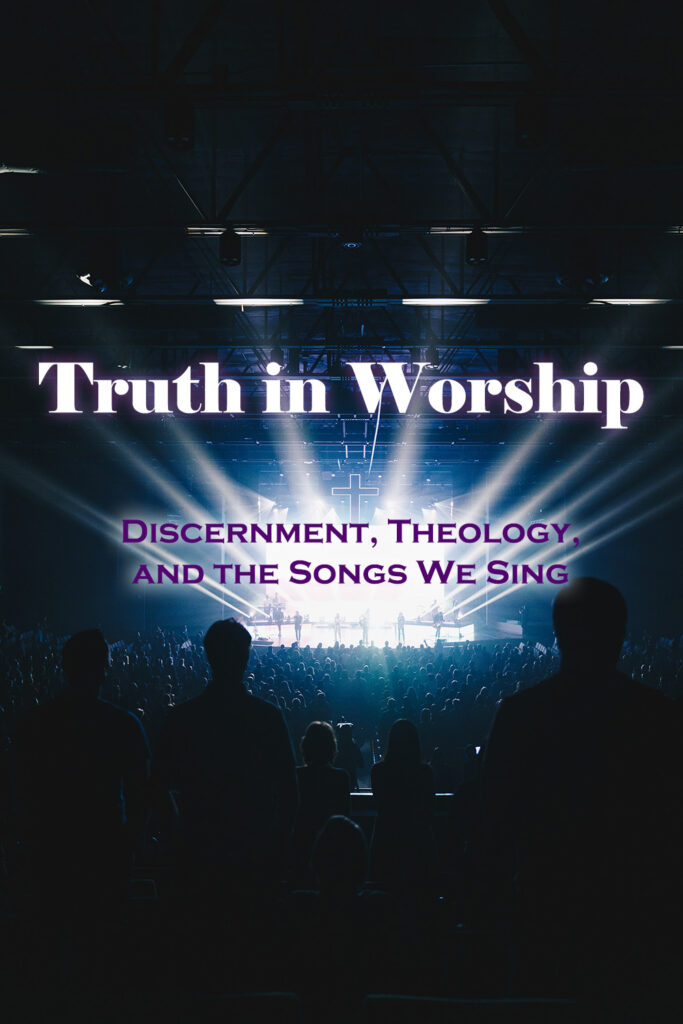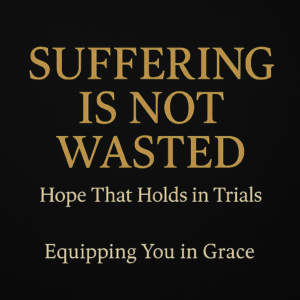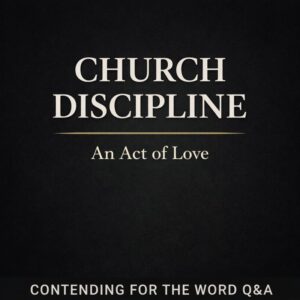⏱️ Estimated Reading Time: 5 min read
Worship Discernment: Five Questions to Ask About Worship Songs and Your Church
By Dave Jenkins
We live in a time where the word “worship” can mean almost anything—and sometimes means almost nothing. For many Christians, worship has become synonymous with a music style, a feeling, or even a concert-like experience. But true biblical worship is not about how we feel, however; it is about who God is and how He has commanded us to approach Him.
In John 4:24, Jesus says, “God is spirit, and those who worship him must worship in spirit and truth.” Worship must be anchored in truth—that is, the Word of God. And yet, in many churches, that anchor has been quietly cut loose. Emotional manipulation, doctrinally vague lyrics, and songs from false teaching movements are leading many away from sound worship.
This article is designed to give you a two-part discernment tool: first, to help you evaluate the songs your church sings, and second, to help you assess what those songs may reveal about your church’s overall direction.
Five Questions to Ask About Worship Songs
One: Is the Song Theologically Sound?
Does it reflect sound doctrine and biblical clarity? Worship lyrics should be saturated with Scripture. They should not merely mention God or Jesus, but rightly represent His nature, attributes, and works. Songs that promote vague spirituality or distort doctrine should be avoided. “Let the word of Christ dwell in you richly, teaching and admonishing one another in all wisdom, singing psalms and hymns and spiritual songs” (Colossians 3:16).
Two: Who is the Song About—God or Me?
Biblical worship centers on God, not the worshiper. Ask whether the song exalts the Triune God or primarily focuses on human emotion or experience. Would someone unfamiliar with Christianity walk away knowing who Jesus is?
Three: Does the Song Clearly Proclaim the Gospel?
Too many modern worship songs mention love, freedom, or victory, but never mention sin, the cross, or grace. True worship exalts Christ crucified and risen. Songs that never mention our need for redemption do not prepare hearts to worship in truth.
Four: Who Wrote the Song and What Do They Believe?
The source matters. Songs written by ministries like Bethel, Hillsong, or Elevation may contain and do likely contain orthodox lyrics, but are financially supporting movements with deep theological error. Romans 16:17 commands us to avoid those who teach contrary to sound doctrine.
Five: What Fruit Does the Song Produce?
Does it encourage awe, reverence, repentance, and joy in the Lord? Or does it create a momentary emotional high with no lasting spiritual impact? “Offer your bodies as a living sacrifice, holy and acceptable to God, which is your spiritual worship” (Romans 12:1).
Five Questions to Ask About Your Church’s Worship
One: Does My Church Prioritize the Preaching of God’s Word, Or Performance?
Is worship shaped by Scripture, or by atmosphere and experience? A church committed to biblical worship will put the exposition of Scripture at the center, not the band.
Two: Are Worship Leaders and Pastors Committed to Biblical Fidelity, Or Following Trends?
Are songs evaluated for theology? Are they chosen because they are true, or because they are popular?
Three: Is There Transparency and Theological Clarity From Leadership, Or Silence And Compromise?
If you ask about worship choices or theological concerns, are you received with openness and biblical reasoning, or with defensiveness and dismissiveness?
Four: Does the Worship Service Lead Me to Deeper Awe of God, Or Just a Temporary Emotional High?
Biblical worship transforms the heart. It doesn’t just entertain; it sanctifies. Ask whether you leave your church service more in love with God’s holiness and His Word.
Five: Am I Being Discipled in Truth, Or Distracted by Experience?
Worship forms our theology. Churches that regularly use emotionally-driven music with shallow theology are forming people in spiritual immaturity. True worship strengthens faith. False worship stunts it.
When Should I Leave a Church Over Worship?
This is a weighty question. Scripture calls us to love our church, to submit to godly elders, and to bear with one another in love. But when a church:
- Persistently sings songs from false teachers despite correction,
- Reduces worship to a concert instead of a corporate, reverent gathering,
- Silences or marginalizes members who raise biblical concerns,
- And/or avoids or waters down the preaching of Scripture in favor of emotional hype,
…then it may be time to pray, seek counsel, and consider finding a church that worships God according to His Word. Leaving a church should never be done lightly. But staying in one that dishonors God in worship may also be a failure of stewardship.
Conclusion: Worship That Honors the Lord
Worship is not just a moment on Sunday—it is a declaration of what we believe about God. Discernment in worship is not about nitpicking songs or judging others’ preferences. It’s about loving the Lord with all our heart, soul, mind, and strength.
Ask the hard questions. Start with Scripture. And remember, true worship is not about what moves us emotionally, but about what glorifies God truthfully. “Stand firm in the faith, act like men, be strong. Let all that you do be done in love” (1 Corinthians 16:13–14).

Truth in Worship: Discernment, Theology, and the Songs We Sing
Dave Jenkins is happily married to his wife, Sarah. He is a writer, editor, and speaker living in beautiful Southern Oregon. Dave is a lover of Christ, His people, the Church, and sound theology. He serves as the Executive Director of Servants of Grace Ministries, the Executive Editor of Theology for Life Magazine, the Host and Producer of Equipping You in Grace Podcast, and is a contributor to and producer of Contending for the Word. He is the author of The Word Explored: The Problem of Biblical Illiteracy and What To Do About It (House to House, 2021), The Word Matters: Defending Biblical Authority Against the Spirit of the Age (G3 Press, 2022), and Contentment: The Journey of a Lifetime (Theology for Life, 2024). You can find him on Facebook, Twitter, Instagram, Youtube, or read his newsletter. Dave loves to spend time with his wife, going to movies, eating at a nice restaurant, or going out for a round of golf with a good friend. He is also a voracious reader, in particular of Reformed theology, and the Puritans. You will often find him when he’s not busy with ministry reading a pile of the latest books from a wide variety of Christian publishers. Dave received his M.A.R. and M.Div through Liberty Baptist Theological Seminary.




